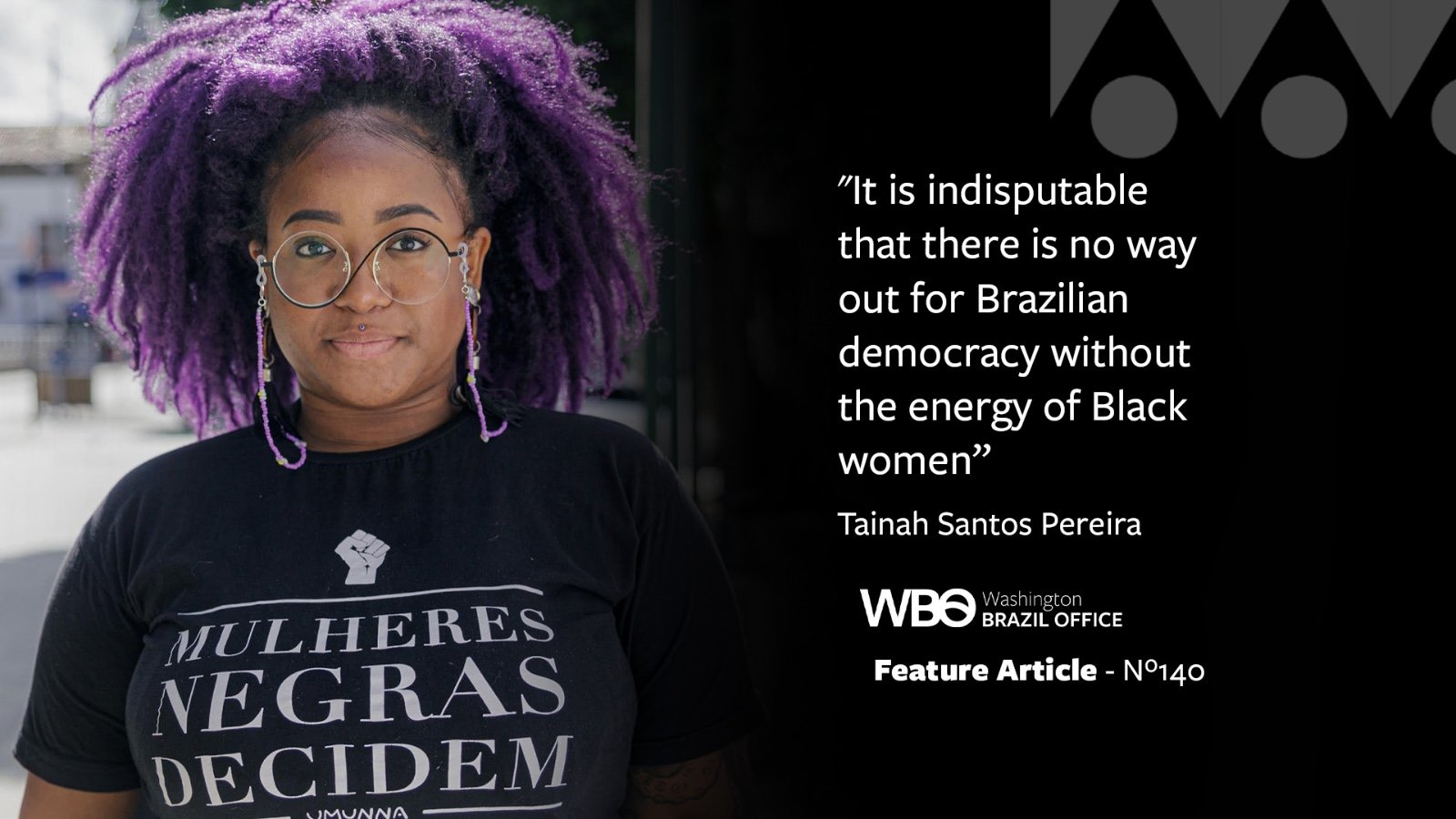Leading Change and Strengthening Democracy
Tainah Santos Pereira is the political coordinator of Mulheres Negras Decidem, a social movement dedicated to promoting the participation of Black women in institutional politics. She is also a PhD candidate in International Political Economy at the Federal University of Rio de Janeiro, with a master’s degree in Political Science from the Federal University of the State of Rio de Janeiro, and a bachelor’s degree in International Relations at Estácio de Sá University. She was a fellow at the Draper Hills Summer Program on Democracy, Development and the Rule of Law in 2022 at Stanford University. This article was written for issue 140 of the WBO weekly newsletter, published on October 25, 2024. To subscribe to the newsletter and receive it for free, enter your email in the indicated field.
The underrepresentation of Black women in positions of power in Brazil is a historic challenge that has been addressed with increasing mobilization and organization. The Mulheres Negras Decidem (Black Women Decide, MND) movement emerged in 2018 with a firm belief in the capabilities of current generations to reverse this scenario, transforming institutional politics ethically and aesthetically. With a network that exteneds throughout the country, the MND carries out campaigns, training sessions, and data-centered research to increase the political participation of these women, ensuring that they have the power to influence the decisions that affect their lives.
It is interesting to note the growing presence of Black women in Brazilian politics. Without a doubt, this is a sign of progress, the result of decades of successful strategies and tactics, built and executed by Black women's movements, collective leaders such as Marielle Franco, Talíria Petrone, Áurea Carolina, Beatriz Caminha, Erika Hilton and many others, who are inspiring forces and examples of resistance and commitment to social transformation based on their actions within positions of power.
In 2024, Dandara Tonantzin stood out as an example of political renewal, running for mayor of the city of Uberlândia in Minas Gerais with proposals focused on racial justice and gender equality. The most recent data from the 2024 elections indicate that 52.73% of local candidates in municipal elections are people who identify as Black or Brown – an increase of about 2.7% compared to the 2020 elections. Although modest, this growth consolidates a positive trend, marking the second consecutive election in which Black candidates outnumber those from other demographic groups.
However, the fight for equity still faces many challenges. In August 2024, the approval of Constitutional Amendment 113/24 reduced the resources allocated to Black candidates by more than R$1 billion (US$175.3 million), generating legal uncertainty and threatening the progress made in recent years. Public resources from the Special Campaign Financing Fund are known to be essential for the viability of Black women's candidacies, contributing significantly to increasing the eligibility rate of this social group.
For this reason, Mulheres Negras Decidem, together with other movements and civil society organizations, is fighting in the Brazilian Supreme Court to reverse this measure, highlighting in Direct Action of Unconstitutionality, No. 7706 the importance of maintaining proportional funding for Black and female candidacies to ensure their effective participation in the elections.
Beyond institutional barriers, we also believe it is important to continue (re)building bridges with Black evangelical communities, recognizing the vital role of Black women as agents of transformation in their churches and territories. Far from stigmas or monolithic views about the evangelical electorate, we understand that these women, who are our mothers, aunts and sisters, can indeed be receptive to political proposals to combat inequalities, especially when it comes to tackling racism and climate change, two absolutely urgent and unavoidable issues.
We also recognize that the apparent fissure of the right in Brazil does not mean that extremist forces such as Bolsonarism have been defeated. Its impact on the electoral results in 2024 remains quite visible, and it will be up to the most progressive sectors to offer an alternative for a tangible future, capable of rekindling hope and mobilizing the masses around a project of real change.
For the MND, it is indisputable that there is no way out for Brazilian democracy without the energy of Black women. Despite our population of over 60 million, even within the left there is persistent criticism of what has been conventionally called “identity politics,” as if addressing racial and gender issues were an obstacle to winning over the masses. However, it is always important to remember that addressing structural inequalities is not a distraction, but a fundamental necessity to guarantee rights and opportunities for all. By empowering Black women, the MND seeks to demonstrate that their capacity for leadership and building solutions results in benefits for all people.
The trajectories of Black women in Brazilian politics reflect a journey of challenges and achievements. The examples of Black women in collective leadership in Brazil, the Americas, and around the world show that transforming historically exclusionary structures is possible. The 2024 elections signal a moment of hope and resistance, with Black women assuming a central role in building a more just and democratic future.


